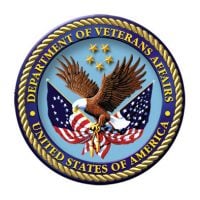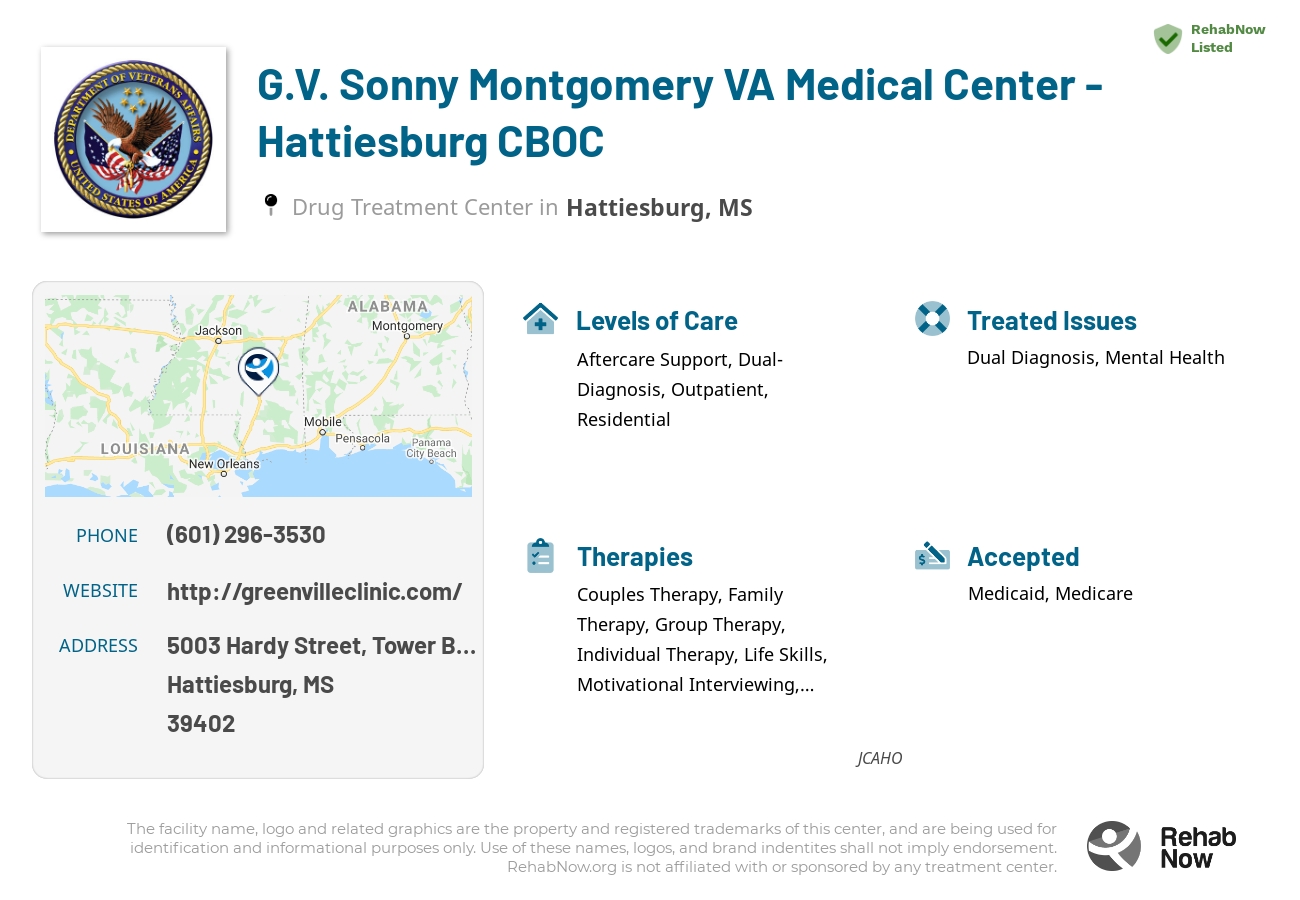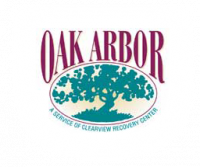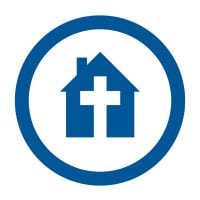About G.V. Sonny Montgomery VA Medical Center - Hattiesburg CBOC in Mississippi
G.V. Sonny Montgomery VA Medical Center - Hattiesburg CBOC is a Dual Diagnosis (Co-Occuring Disorders), Mental Health, Drug Treatment Facility in Hattiesburg, Mississippi offering treatment for Dual Diagnosis (Co-Occuring Disorders), Mental Health. Aftercare Support, Dual-Diagnosis, Outpatient, Residential Care, and additional Clinical Treatments are offered here.
G.V. Sonny Montgomery VA Medical Center - Hattiesburg CBOC offers a variety of treatment methods that can help addicts get sober and stay clean for good. Their professional staff is dedicated to helping each person who walks through their doors find the right path towards each individual's recovery. Both men and women are welcomed for treatment here. Treatment here is offered to all genders, and they also notably support LGBTQ+.
Accreditations, licenses, and certifications are all important when selecting a center. This center has Joint Commission accreditation. Payment methods here are Medicaid, Medicare, Sliding Scale and potentially more case-based methods are available. If you have health insurance, we are not sure this facility will be covered by your policy, contact our admissions experts with any questions about where your insurance will cover treatment.
Genders
Ages
Modality
Additional
Accreditations

JCAHO
Conditions and Issues Treated
Recovery is not simply about stopping drug use. Recovery is working with addiction while recovering mental health issues that are fueling the addiction in the first place.
Levels of Care Offered
This center offers a variety of custom treatment tailored to individual recovery. Currently available are Aftercare Support, Dual-Diagnosis, Outpatient, Residential, with additional therapies available as listed below.
Outpatient treatment is considered the lower intensity level of addiction treatment. It’s ideal for early phase addiction or lower intensity addictions. It may include weekly sessions instead of daily. It may include weekly sessions instead of daily. Peer group support, 12-step programs, and individual counseling may still be involved but at a lesser frequency than an intensive outpatient program. It is a good choice for someone who doesn’t need to go through a medically supervised detox and who has a supportive home environment. It requires motivation and dedication to commit to the program without constant monitoring.
Residential treatment programs are those that offer housing and meals in addition to substance abuse treatment. Rehab facilities that offer residential treatment allow patients to focus solely on recovery, in an environment totally separate from their lives. Some rehab centers specialize in short-term residential treatment (a few days to a week or two), while others solely provide treatment on a long-term basis (several weeks to months). Some offer both, and tailor treatment to the patient’s individual requirements.
Aftercare support should take place after outpatient treatment has ended. There are a few different types of aftercare support that patients can seek. These include 12 Step, Self-help groups (AA, NA), Therapeutic communities, Long-term, structured sober living arrangements, and Halfway houses (residential treatment centers).
Therapies & Programs
Individual therapy involves one-on-one sessions between the patient and therapist. It provides patients with a safe environment to openly discuss personal and sensitive issues with the therapist. They find the therapist as someone they can trust. Individual therapy aims to identify the core issues that would have led the patient to substance abuse and address them effectively. The therapist can develop patient-specific customized solutions through individual therapy, which aids speedier recovery.
Couples therapy works with clients and significant others in a professional capacity to improve relationship dynamics. This can be helpful for addicts who are trying to marry the idea of recovery into their work, family, social lives – any aspect that has to do with relationships.
Through counseling sessions, addicts will have an opportunity to talk about their addiction with professional partners. These partners can offer feedback and advice on how to get sober while keeping healthy relationships intact. A good couples therapist will help addicts understand their part in an unhealthy relationship dynamic or find ways to deal with anger or resentment from significant others outside of the home.
Family therapy is a group problem-solving that aims to improve communication and relationships between the addict, their family, and sometimes friends. The main goal of family therapy for drug addiction is to create an environment where communication can occur without judgment, hostility, or blame. The therapist is with the family as they learn to communicate differently, especially with the addict when s/he is using. The family can learn to reduce their enabling behavior or rally together and support each other during tough times.
An addict’s family can play a vital part in helping them to avoid relapse because they can spot the warning signs and help them get back on track before it becomes too much of a problem. Family therapy is one of the most effective ways to help addicts stay on the path to long-term sobriety. When a drug addict decides that they want to try and get sober, it takes the support of every person they love to succeed. It can be incredibly difficult for loved ones to watch an addict go through the pain and suffering of withdrawal, but by being there with them and supporting them, they can help to make sure that the addiction never returns.
Groups typically involve meetings with other recovering addicts who can relate to one another’s experiences. They might meet in person or online and typically focus on the process of staying sober rather than overcoming a specific addiction.
In these groups managed by G.V. Sonny Montgomery VA Medical Center - Hattiesburg CBOC, addicts can build a sense of community and develop strong emotional connections with others who understand what they are going through. These beneficial relationships can help addicts overcome their cravings and prevent relapse at any point during the recovery process.
In general, trauma therapy is a clinical process that helps individuals deal with mental stress often caused by traumatic events. The therapist helps the person identify, understand, and work through the problem. This is done with the help of talking about it in group or one-on-one counseling sessions. Therapists use relaxation, role-playing, art, and music to help the person open up about what is bothering them.
There are many different types of trauma therapists, such as psychiatric nurses and counselors. Not everyone is a good candidate for this type of therapy; it is generally reserved for people who have recently experienced a traumatic event and struggle to get over it. It is often done for children, teenage victims of sexual assault, and war veterans.
Since addiction is a chronic physical and mental illness, addicts need to learn as many life skills as possible. Many drug treatment centers offer life skills activities as part of their addiction recovery programs. Examples include cooking classes, employment training, resume writing seminars, parenting classes, and computer training. Life skills activities help addicts find employment, take care of their families, and give back to the community.
The goal of medical nutrition therapy for drug and alcohol addiction is to help patients avoid “trigger” foods. For example, someone who craves alcohol may be addicted to sugar. Making sure this person eats a balanced diet with recommended amounts of protein, vegetables, and fruit can help manage urges to drink.
Nicotine replacement therapy treats nicotine addiction using external sources of nicotine, such as patches or gum to substitute for nicotine. This allows people trying to quit smoking to get their desired dose of nicotine without actually having to smoke cigarettes. The idea behind NRT is that by providing smokers with nicotine in forms that are not cigarettes, they may be more likely to quit smoking.
NRT has been available for many years now, and there is a wealth of evidence that shows that it helps people trying to quit smoking. There are several different types of NRT devices on the market now. Patients interested in quitting smoking should talk to their doctors about the best kind of NRT for them.
Payment Options Accepted
For specific insurance or payment methods please contact us.
Associated Centers
Discover treatment facilities under the same provider.
- Alano Society in Valley City, ND
- Discovery Point Retreat - Waxahachie in Waxahachie, TX
- ARC - Arizona Rehab Campus in Tucson, AZ
- The Lighthouse Community - San Diego in San Diego, CA
- Defining Wellness Centers in Brandon, MS
Learn More About Centers
Additional Details
Specifics, location, and helpful extra information.
Hattiesburg, Mississippi 39402 Phone Number(601) 296-3530 Meta DetailsUpdated November 25, 2023
Staff Verified
G.V. Sonny Montgomery VA Medical Center - Hattiesburg CBOC Patient Reviews
There are no reviews yet. Be the first one to write one.
Hattiesburg, Mississippi Addiction Information
Mississippi has one of the highest rates of drug and alcohol abuse-related deaths. Approximately 350,000 residents use illicit drugs every year while another 108,000 abuse alcohol. In one year, doctors in Mississippi prescribed 76.8 opioid prescriptions for every 100 persons. This compares to the national rate of 51.4 prescriptions.
Unfortunately, drug addiction in Hattiesburg, Mississippi, is widespread. According to recent statistics, over 1,000 reported drug abuse cases in the city in 2016 alone. From 2014 to 2016, the number of opioid prescriptions dispensed in Hattiesburg increased by 18%. A few different drug treatment options are available in Hattiesburg, Mississippi. These include inpatient and outpatient rehab facilities and 12-step programs and support groups.
Treatment in Nearby Cities
- Pittsboro, MS (180.8 mi.)
- Ashland, MS (242.8 mi.)
- Vicksburg, MS (113.7 mi.)
- Collins, MS (24.7 mi.)
- Carrollton, MS (154.4 mi.)
Centers near G.V. Sonny Montgomery VA Medical Center - Hattiesburg CBOC
The facility name, logo and brand are the property and registered trademarks of G.V. Sonny Montgomery VA Medical Center - Hattiesburg CBOC, and are being used for identification and informational purposes only. Use of these names, logos and brands shall not imply endorsement. RehabNow.org is not affiliated with or sponsored by G.V. Sonny Montgomery VA Medical Center - Hattiesburg CBOC.









